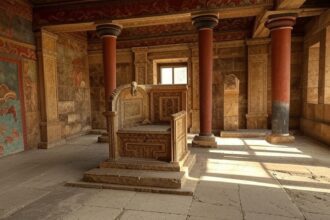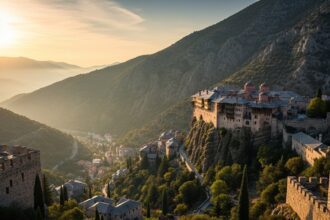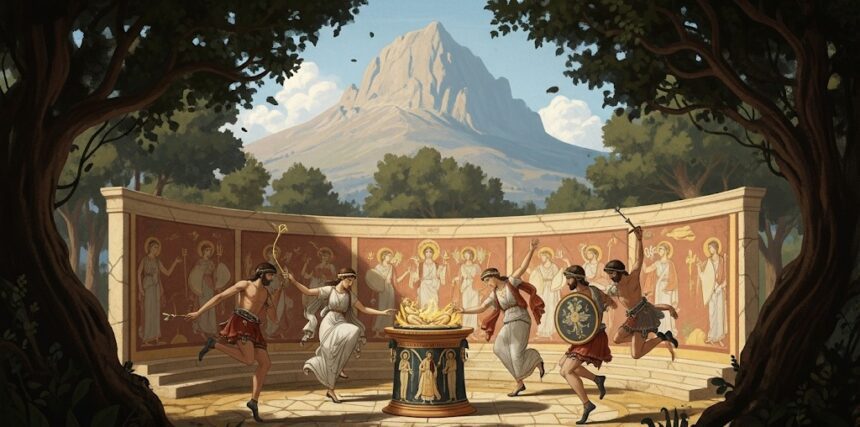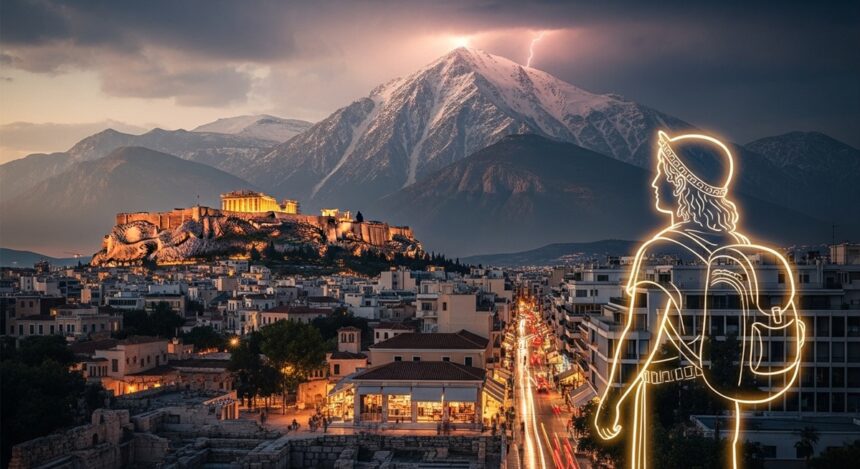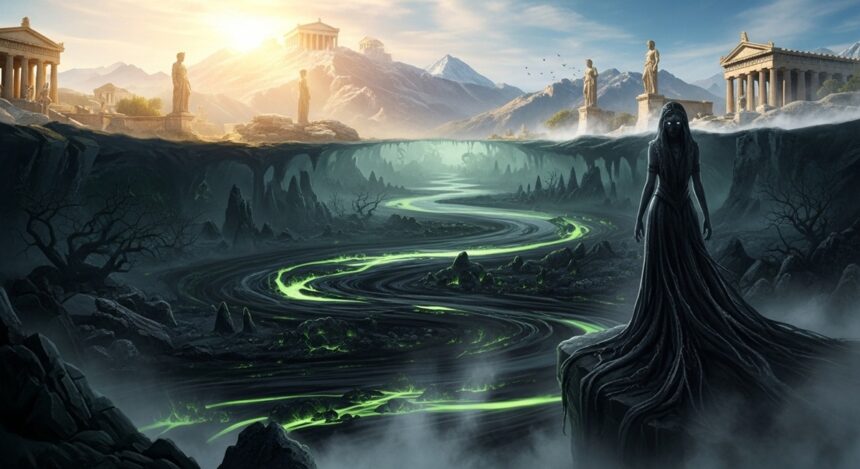When you walk through the sun-drenched ruins of Mycenae, or gaze out across the plains of Thessaly, you’re not just witnessing ancient stones—you’re retracing the footsteps of shadowy figures from a time before Hellenic Greece had even taken form. Among the most elusive of these prehistoric peoples are the Pelasgians, hailed by ancient writers as the first inhabitants of Greece and often regarded as the mythical ancestors of the Greeks.
The story of the Pelasgians is a unique crossroads of mythology, linguistic mystery, and archaeological enigma, deeply interwoven with the geography and identity of Greece itself. From the Arcadian mountains to the island of Lemnos, their presence lingers like a whisper in stone and legend.
Who Were the Pelasgians?
Myth or Historical People?
The name “Pelasgians” (Πελασγοί) appears throughout ancient Greek literature—Homer, Herodotus, Thucydides, and Strabo all mention them—but none can pin down their precise identity. Ancient Greek writers broadly used the term to describe pre-Hellenic populations scattered across the Aegean and the Greek mainland. Sometimes they were considered foreign, other times they were merely earlier Greeks. This ambiguity has created fertile ground for mythological associations and archaeological theories, but very few concrete answers.
Pelasgus: The First Man from the Earth
One of the most compelling myths involves Pelasgus, the eponymous ancestor of the Pelasgians. In some traditions, he was not born of a woman, but emerged directly from the earth itself—a divine autochthon, symbolizing mankind’s original bond with the land.

In Arcadia, an ancient mountainous region in the Peloponnese, it was believed that Pelasgus fathered Lycaon, the mythical king whose legacy continues in the name of Mount Lykaion. This peak, sacred to Zeus, was the site of mysterious rituals and an important religious center during antiquity. Visiting Mount Lykaion today, one walks where myth says gods once mingled with men—a sacred geography that has remained unchanged for millennia.
Pelasgian Argos and the Thessalian Connection
According to Strabo, the Pelasgians once inhabited a region of Thessaly known as Pelasgian Argos, later renamed Pelasgiotis. This region in central Greece is often overlooked by modern travelers, but its flat expanses and ancient cities like Larissa carry echoes of Pelasgian presence.
Interestingly, Pelasgus is sometimes said to have been the father of Larissa, after whom the city is named. Others cite him as the son of Poseidon and the nymph Larissa, making him not only of divine descent but also symbolically tied to the land and its waters. Exploring Larissa today offers more than Byzantine churches and lively cafés—it’s a step into a place once considered the very cradle of the earliest Greeks.
Lemnos: Island of the Pelasgians
Few places retain a stronger association with the Pelasgians than the island of Lemnos in the northern Aegean Sea. Herodotus refers to the inhabitants of Lemnos as Pelasgian even in his own time, describing their language as non-Greek, possibly pre-Indo-European. Kaviria, one of the island’s major archaeological sites, is rich with mystery cults and subterranean structures that seem to defy explanation.

When visiting Lemnos, the blend of natural serenity, prehistoric ruins, and mythic symbolism offers a unique travel experience—one where the boundary between myth and history becomes almost imperceptible.
Arcadia: Where Earth and Myth Converge
In the wild heart of the Peloponnese, Arcadia was believed to be the most ancient part of Greece and the birthplace of Pelasgus. Ancient geographers called it “Pelasgia” before it acquired the name Arcadia. Pelasgus here was depicted not just as a ruler but a civilizing hero who taught people to build huts, wear clothes, and cultivate the land.
Traveling through modern Arcadia, with its dense forests, mountain villages like Dimitsana and Stemnitsa, and panoramic views, one feels a rare stillness—as if the landscape itself has chosen to preserve the memory of its mythical forebears.
The Pelasgian Puzzle: Modern Theories and Archaeology
A Lingering Enigma
Modern historians and linguists have attempted to identify the Pelasgians with several archaeological cultures, most notably the Early Helladic and Cycladic civilizations. But the absence of definitive Pelasgian inscriptions has left the puzzle unsolved. Some have speculated links to the Sea Peoples mentioned in Egyptian records or even to proto-Etruscan migrations.

Despite decades of scholarship, the Pelasgians remain a phantom civilization, known more through the filter of myth than the clarity of archaeological proof. This has only added to their mystique, especially for those traveling to uncover the hidden stories behind Greece’s ancient ruins.
Travel Through Pelasgian Greece: Destinations Steeped in Myth
1. Larissa (Thessaly)
Wander the old town and visit the ancient acropolis—possibly once sacred to Pelasgian rulers.
2. Mount Lykaion (Arcadia)
Hike to the summit for sweeping views and visit the altar of Zeus, where Lycaon was said to have sacrificed.
3. Lemnos Island
Explore Kaviria, walk along the windswept beaches, and visit the Hephaestia site—dedicated to the god who shared the island with the Pelasgians.
4. Argos (Peloponnese)
An ancient city linked to Pelasgus, Argos offers ruins from multiple eras, including Mycenaean and classical.
5. Dodona (Epirus)
Though not directly Pelasgian, Dodona was home to the oldest oracle in Greece, where Zeus was worshipped by pre-Hellenic tribes.
Myth and Memory in the Greek Landscape
The legend of the Pelasgians reveals something essential about Greece as a travel destination—it is a living mythological geography. Every region, every stone, every name carries echoes of stories older than history.
To follow the footsteps of the Pelasgians is to journey into the pre-dawn of Western civilization, to a time when gods still walked among mortals and the line between fact and myth was yet to be drawn. It is an adventure for the curious, the scholarly, and the spiritually inclined traveler.
Pelasgians: A forgotten dimension of Greece
In today’s Greece, where modern tourism often centers around beach resorts and classical ruins, the Pelasgian legacy offers something different—a deeply immersive, myth-infused experience. It invites travelers to go off the beaten path, to explore not just visible history but the invisible layers beneath.
Whether you’re a mythology enthusiast, an archaeological wanderer, or a seeker of the ancient spirit, retracing the story of the Pelasgians reveals a forgotten dimension of Greece—one where myth and memory merge into a deeper truth.









